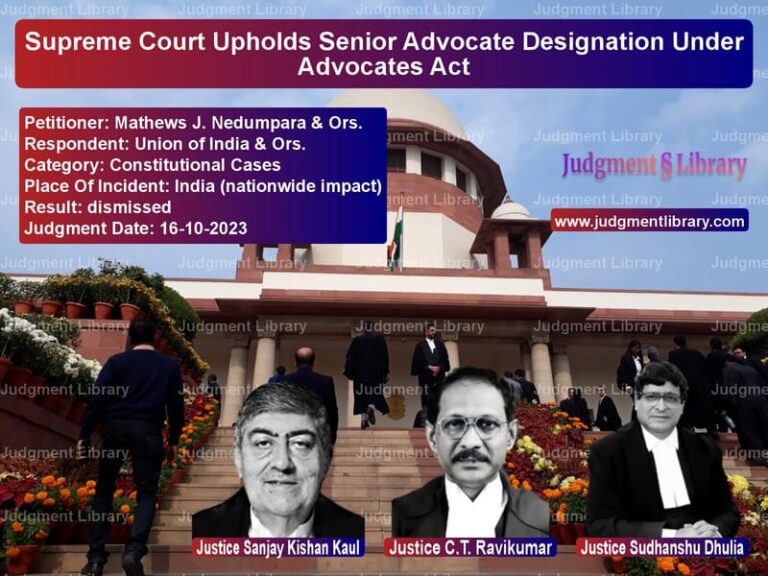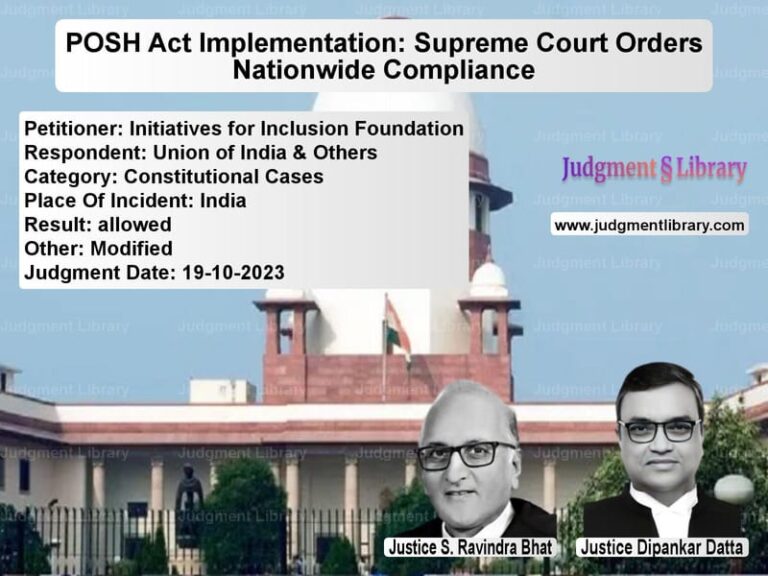Supreme Court Rules on EPFO Pension Scheme: Key Amendments and Employee Rights
The Supreme Court of India recently ruled on a significant dispute concerning amendments to the Employees’ Pension Scheme (EPS), 1995, made in 2014. The case, Employees Provident Fund Organization & Anr. vs. Sunil Kumar B. & Ors., revolved around the legality of these amendments, particularly regarding the eligibility criteria for pension benefits, the imposition of additional contributions, and the cut-off dates introduced by the government.
The petitioners, a group of employees and their unions, challenged the amendments, arguing that they were arbitrary, unfair, and in violation of previous Supreme Court rulings. The case had significant implications for millions of employees contributing to the Employees’ Provident Fund (EPF) and seeking pension benefits under the EPS framework.
Background of the Case
The Employees’ Pension Scheme (EPS), 1995, was introduced to provide social security to employees upon retirement. Employees who contributed to the EPF were entitled to pension benefits under this scheme, provided they met specific eligibility criteria.
In 2014, the central government introduced significant changes to the EPS through an amendment, which included:
- Raising the salary cap for pensionable salary from ₹6,500 to ₹15,000 per month.
- Requiring employees earning beyond ₹15,000 per month to make an additional contribution of 1.16% of their salary to the pension fund.
- Restricting eligibility for higher pension benefits to only those employees who had exercised the option to contribute on their actual salaries before September 1, 2014.
- Changing the method of calculating pensionable salary from the last 12 months’ average salary to the last 60 months’ average salary.
The petitioners argued that these amendments unfairly limited their pension benefits, imposed additional financial burdens, and arbitrarily restricted eligibility for pension options. They contended that the amendments violated their fundamental rights and were inconsistent with the Supreme Court’s previous ruling in R.C. Gupta vs. EPFO, where the Court held that employees should not be denied higher pension benefits if they contributed on their actual salaries.
Arguments by the Petitioners
The petitioners, including employees and their unions, raised the following key arguments:
- The imposition of the 1.16% additional contribution lacked statutory authority and was not justified under the Employees’ Provident Funds and Miscellaneous Provisions Act, 1952.
- The amendment’s cut-off date (September 1, 2014) was arbitrary and unjust, as employees were not adequately informed about the option to contribute beyond the salary cap.
- The shift from the last 12 months’ salary to the last 60 months’ salary for pension calculation unfairly reduced pension benefits.
- The government failed to consider that many employees had been wrongfully excluded from opting for higher pension contributions due to administrative lapses by their employers.
- The amendment was inconsistent with the Supreme Court’s ruling in R.C. Gupta vs. EPFO, which allowed employees to contribute to the pension scheme on their full salary without restrictions.
Arguments by the Respondents (EPFO and Union of India)
The EPFO and the Union of India defended the amendments, arguing that they were necessary for the long-term financial stability of the pension scheme. Their key arguments were:
- The amendment was intended to protect the pension fund from financial strain due to increased pension liabilities.
- The additional contribution of 1.16% was required to sustain the higher pension payouts without burdening the government.
- The government had provided employees ample time to exercise their option before the cut-off date.
- The change in the calculation of pensionable salary (from 12 months’ average to 60 months’ average) was in line with international best practices for pension schemes.
- Allowing all employees to contribute beyond the salary cap without restrictions would create a significant financial imbalance in the pension scheme.
Supreme Court’s Observations
The Supreme Court analyzed the amendments in light of the legal framework, previous judgments, and principles of fairness. The Court made the following observations:
“The imposition of an additional 1.16% contribution on employees exceeds the statutory limits set under the Employees’ Provident Funds and Miscellaneous Provisions Act, 1952. The burden of maintaining the pension fund should not be shifted solely to employees.”
On the issue of the cut-off date, the Court held:
“The arbitrary imposition of September 1, 2014, as a cut-off date for opting into the pension scheme violates employees’ rights. Many employees were unaware of the option or were prevented from exercising it due to administrative delays.”
Regarding the calculation of pensionable salary, the Court found:
“The shift from the last 12 months’ salary to the last 60 months’ salary for pension computation is a reasonable policy decision aimed at ensuring pension stability.”
Judgment Outcome
The Supreme Court partially allowed the petition and ruled:
- The 1.16% additional contribution requirement was unconstitutional and must be removed.
- Employees who had not exercised their option to contribute beyond ₹15,000 before September 1, 2014, would be given four more months to opt in.
- The change in the pensionable salary calculation from the last 12 months’ salary to the last 60 months’ salary was upheld.
- Employees of exempted establishments (private trusts managing EPF funds) were entitled to higher pension benefits, provided they transferred their funds to the EPFO.
Key Takeaways from the Judgment
- The Court upheld employees’ rights to opt for a higher pension and removed the unfair 1.16% additional contribution.
- The ruling ensures that employees who were wrongfully excluded from opting into the pension scheme are given another chance.
- The government must now find an alternative way to fund pension liabilities without imposing additional financial burdens on employees.
- The shift to calculating pension based on 60 months’ salary instead of 12 months’ salary remains in force.
Conclusion
The Supreme Court’s ruling in this case is a landmark judgment that protects employees’ pension rights while ensuring the long-term sustainability of the pension fund. The decision strikes a balance between financial prudence and employees’ right to fair pension benefits, reinforcing that any changes to social security schemes must be made with transparency and fairness.
Petitioner Name: Employees Provident Fund Organization & Anr..Respondent Name: Sunil Kumar B. & Ors..Judgment By: Justice Uday Umesh Lalit, Justice Aniruddha Bose, Justice Sudhanshu Dhulia.Place Of Incident: India.Judgment Date: 03-11-2022.
Don’t miss out on the full details! Download the complete judgment in PDF format below and gain valuable insights instantly!
Download Judgment: employees-provident-vs-sunil-kumar-b.-&-ors-supreme-court-of-india-judgment-dated-03-11-2022.pdf
Directly Download Judgment: Directly download this Judgment
See all petitions in Pension and Gratuity
See all petitions in Judgment by Uday Umesh Lalit
See all petitions in Judgment by Aniruddha Bose
See all petitions in Judgment by Sudhanshu Dhulia
See all petitions in partially allowed
See all petitions in supreme court of India judgments November 2022
See all petitions in 2022 judgments
See all posts in Service Matters Category
See all allowed petitions in Service Matters Category
See all Dismissed petitions in Service Matters Category
See all partially allowed petitions in Service Matters Category







